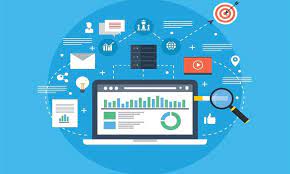Data-driven marketing is a strategic approach to marketing that relies on data analysis and insights to inform decision-making and optimize marketing campaigns. In today’s digital age, where vast amounts of data are generated every day, data-driven approaches are essential for marketers to effectively reach and engage their target audiences. In this article, we explore the art of data-driven marketing and how organizations can leverage data to enhance their marketing efforts.
Introduction to Data-Driven Marketing
Data-driven marketing involves using data analysis and insights to guide marketing strategies and tactics. By leveraging data from various sources, including customer interactions, website analytics, and market research, marketers can gain valuable insights into consumer behavior, preferences, and trends. Data-driven approaches enable marketers to personalize messages, target specific audience segments, and measure the effectiveness of their campaigns with greater precision.
Understanding Data Sources and Collection
Data for marketing purposes can be sourced from multiple channels, including first-party data collected directly from customers, second-party data acquired through partnerships or collaborations, and third-party data purchased from external sources. Methods for collecting and aggregating data may include website analytics, customer surveys, social media monitoring, and CRM systems. By consolidating and analyzing data from diverse sources, marketers can gain a comprehensive understanding of their target audience and market dynamics.
Data Analysis and Insights Generation
Data analysis is a crucial step in data-driven marketing, involving techniques such as descriptive, predictive, and prescriptive analytics. Descriptive analytics help marketers understand what has happened in the past, while predictive analytics forecast future trends and behaviors. Prescriptive analytics provide actionable recommendations for optimizing marketing strategies and campaigns based on data insights. By analyzing marketing data, marketers can identify patterns, trends, and opportunities to drive business growth and customer engagement.
Personalization and Targeting
Personalization is a key tenet of data-driven marketing, enabling marketers to deliver relevant and timely messages to individual customers. By leveraging customer data, such as demographics, browsing history, and purchase behavior, marketers can tailor content and offers to match the preferences and interests of each customer. Targeting specific audience segments based on demographic, psychographic, and behavioral attributes allows marketers to reach the right audience with the right message at the right time, maximizing the impact of their marketing efforts.
Optimization and Testing
Optimization and testing are essential components of data-driven marketing, enabling marketers to refine their strategies and campaigns for maximum effectiveness. A/B testing and multivariate testing allow marketers to experiment with different messaging, creative elements, and targeting parameters to identify the most effective approaches. By testing and iterating on their marketing efforts, marketers can continuously improve performance and drive better results over time.
Attribution and ROI Measurement
Attribution and ROI measurement are critical for assessing the effectiveness of marketing activities and allocating resources efficiently. By tracking and attributing marketing activities to specific outcomes and conversions, marketers can determine which channels and campaigns are driving the most value for their business. Measuring ROI allows marketers to demonstrate the impact of their efforts on business goals and justify investment in marketing initiatives.
Compliance and Data Privacy
In the era of data privacy regulations such as GDPR and CCPA, compliance and data privacy are paramount considerations for data-driven marketers. Marketers must ensure that they collect, store, and use customer data in compliance with applicable regulations and industry standards. Respecting customer privacy and maintaining trust through transparent data practices are essential for building lasting relationships with customers and protecting brand reputation.
Technology and Tools for Data-Driven Marketing
A wide range of marketing technology (MarTech) tools and platforms are available to support data-driven marketing efforts. These tools encompass data management, analytics, automation, and personalization capabilities, enabling marketers to manage and leverage data effectively across the marketing lifecycle. Examples of popular MarTech solutions include customer relationship management (CRM) systems, marketing automation platforms, and analytics tools such as Google Analytics and Adobe Analytics.
Building a Data-Driven Marketing Culture
Building a data-driven marketing culture requires fostering a mindset of curiosity, experimentation, and continuous learning within marketing teams and organizations. Providing training and resources to empower marketers to leverage data effectively and encouraging cross-functional collaboration between marketing, data analytics, and IT teams are essential for driving a data-driven culture. By prioritizing data-driven approaches and investing in talent development, organizations can unlock the full potential of their marketing efforts.
Challenges and Considerations
While data-driven marketing offers significant benefits, it also presents challenges and considerations for marketers. Common challenges include data quality issues, data integration complexities, and interpretation of data insights. Marketers must also navigate ethical considerations and consumer concerns around data privacy and security. Strategies for overcoming these challenges may include investing in data governance, technology infrastructure, and talent development to ensure that marketers have the skills and resources needed to succeed in a data-driven environment.
Conclusion
In conclusion, data-driven marketing is an art form that empowers marketers to leverage data insights to create personalized, targeted, and effective marketing campaigns. By understanding data sources, analyzing data insights, and leveraging technology and tools, marketers can optimize their strategies and drive better business outcomes. Building a data-driven marketing culture and addressing challenges and considerations are essential for maximizing the value of marketing data and unlocking the full potential of data-driven marketing.

